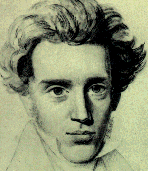











 Soren Kierkegaard
Soren Kierkegaard


“Christianity is therefore not a doctrine, but the fact that God has existed.”
Kierkegaard is considered the first relatively modern existentialist. He understands that there is an ever-present horror in all our lives that is death, which cannot be ignored or pushed aside by any means. It is an unavoidable fact that our lives are meaningless in comparison to the rest of the universe and its existence.
There are three modes of existence that can be chosen by an individual.
aesthetic = a redefined hedonism, consisting of the search for pleasure
ethical = involves intense commitment to one’s duty in faith and social obligations
religious = submission to God, and only God’s will
That said, Kierkegaard believe that individuals reat their own nature through choices; existing requires being in touch with oneself and having a passion for living. He reasons that the aesthetic way of life is a constant search to prevent boredom, which must be faced eventually; the ethical way will lead to the loss of individual worth; therefore, Kierkegaard feels that the religious way of life is the best for all people to follow.
 On Truth
On Truth
Truth is found through subjectivity and an individual, unique apprehension of things. It is also found through deep engagement with the world, and not detached “objectivity” the way scientists believe it to be found.
On God
It is not enough for people to simply believe in God’s existence. To trust in Him requires the faith that propels the abolishment of doubt that He will keep His promises to us. Kierkegaard says that all attempts at rational justification of God’s pure existence are in themselves irrational, because the absolute gap between finite man and the infinite God is so great that any rational bridge to connect the two cannot be built.
On Christ’s Salvation
How we believe in Christ’s message is just as important as what we believe of it. The truth of the Trinity consists of the proper relationship between the belief and the subject of belief (the Trinity). Also, Kierkegaard sets the idea of the “leap of faith”, which is this: There is no such thing as having a little bit of faith. Either we truly believe and trust in God, or we don’t. Thus, we must prepare for this leap; we are to culmulatively cultivate a special relationship with God before truly stating I BELIEVE.